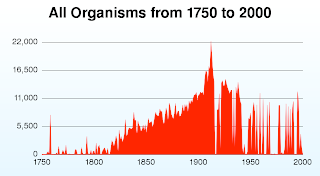
Source:
http://taxatoy.ubio.org/
If you have not done so, I highly recommend you visit TaxaToy (link above), another clever contribution from the UBIO crew at Woods Hole. When you drill down to less inclusive taxa it is fascinating to see the pattern, frequently tracking the cyclic nature of monography and major revisions. Recognizing that all data is not yet available and particularly for recent years, the overall pattern is broadly consistent with seat of the pants history. There was a strong positive trend in the annual rate of species description with an expected hiatus at the time of the World Wars. Taxonomy bounced back quickly to pre-War levels but after WWII it never regained its positively accelerating trajectory. When one factors in the post-War growth in the academic workforce and the technological leaps since, this becomes a sad picture.
It is not coincidental that the WWII period was marked also by Huxley's "The New Systematics" and shortly thereafter Mayr's "Systematics and the Origin of Species" --- what might as well have been titled "Systematics the Demise of Taxonomy." Capitalizing on the wave of excitement (appropriately) associated with the rise of modern genetics and galvanizing a strong bias toward experimental biology already well established in the U.S. and Europe, Mayr and his comrades found it an easy matter to diminish "merely descriptive" taxonomy in the eyes of modern, right-minded, "population thinking" biologists.
If we are to learn enough about our planet's species to develop fact-based policies and strategies to achieve sustainable biodiversity, we not only must renew the upward course of species discovery and description, we must reverse the devastating effects of this short-sighted neglect of taxonomy.
Almost any combination of several options could immediately speed taxonomy by an order of magnitude to say 200,000 species per year: providing support to existing taxonomists in the form of staff and funding, modernizing the research platform for taxonomy with special investment in cyberinfrastructure, and focusing efforts of distributed collections and experts as demonstrated in the successful NSF-funded Planetary Biodiversity Inventory (PBI) projects.



No comments:
Post a Comment